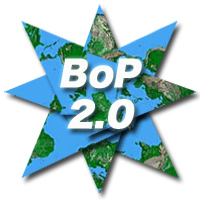BoP Incentives, Criticisms, and Developments
2 Big Reasons why firms enter the BoP
- Market Creation - stagnating here, stalled There.
Quoting an executive at one of the world's largest toy companies: "There's very little industry growth, companies in my industry are pretty much just shifting profits around". Meanwhile, the 4+ billion people in the BoP - representing a potential multi-trillion market - are largely underserved and often vastly over charged (see Prahalad and Hammond). One group needs growth, the other group needs services. Companies that can bring the two groups together have great potential for huge profits.
Of course, the BoP is not a homogeneous population of 4 billion people, nor do most BoP regions have market and social infrastructures that are familiar to most MNCs. In fact, most MNCs’ current value propositions (via their existing suite of products and services) are so ill matched to the needs, knowledge, and accessibility of poor communities that in real terms it could be said that no market segment exists for these companies at all. However future markets certainly do (where was the market for one-way van rentals before U-Haul, the market for coffee culture before Starbucks?)... the strategic advantage therfore comes in figuring out how to create business models that both grow a new market and capture its potential at the same time. As business strategists W. Chan Kim and Renee Mauborgne might say, it's about the creation of "blue oceans", not just the exploitation of existing ones.
- Incubating Disruptive Innovations - the rewards of serving emerging markets
Clay Christensen solidified the concepts of disruptive innovations (new innovations that upstage old, established technologies and companies) in his book the Innovator's Dilemma. One feature that he found through his research is that disruptive innovations almost always incubate in emerging markets, as far away from the mainstream markets as possible! Christensen and Stuart Hart, in their article "The Great Leap" go on to discuss how the BoP is a perfect place to develop and incubate disruptive innovations. The BoP also offers huge potential for innovation in utility, what we at BRINQ call the novel and unexpected ways in which people use technology.
Criticisms of the BoP - "Selling to the Poor"
For the last couple of years there has been a growing backlash to the BoP as a business or development strategy, with various NGOs, academics, and individuals decrying the BoP as a set of business strategies designed to just sell more stuff to poor people (scan through WRI's NextBillion.net to find a few of these debates). For many groups embracing the BoP that criticism unfortunately holds true: the groups' principal question being "What are the best methods to market products to this huge population of novice consumers?" Sometimes their strategies involve innovating new products and services, but ultimately they focus on how to sell more stuff to people who can questionably afford it. Some of the critics of BoP business strategies have claimed the only way forward is to reverse the model, have BoP businesses selling more stuff to rich people. We believe this whole debate comes from a very simplistic view of the BoP as just a market of consumers... or to paraphrase from a shoe company's perspective, "the BoP is 8 billion feet."
Moving to interdependence - BoP version 2.0

Outside of the debate mentioned above are a number of entrepreneurs and thought leaders who are quietly moving BoP strategies and methodologies on to another level, what we here at BRINQ call BoP version 2.0. Led by Cornell University's Stuart Hart and others, these innovators (which includes us here at BRINQ) recognize that the BoP is a full, rich, and diverse population: full of its own innovators, entrepreneurs, businesses, cultures, and opportunities to match the richness that exists in the developed world. Forcing each into just one role of producer or consumer would be like asking a soccer player to stay in just one portion of the field... you could do it but your team probably wouldn't win, nor would anyone have any fun! Instead, proponents of this BoP 2.0 vision are developing methodologies focused on the principle of interdependence: creating partnerships with poor communities and viewing the poor as innovators, entrepreneurs, producers, consumers, market creators, researchers and more. Ultimately we're talking about flipping all the "pyramids" around to create new world and market realities!
To learn more about this growing work, check out Stuart Hart's Capitalism at the Crossroads and work with the Base of the Pyramid Protocol and here on our BRINQ Blog.



